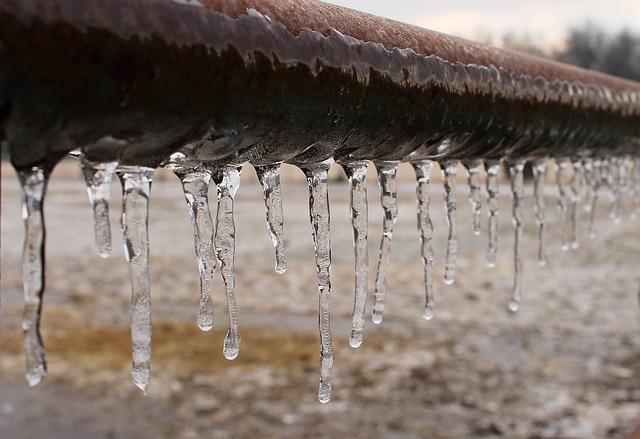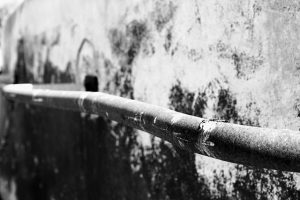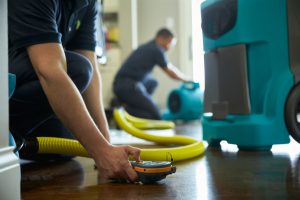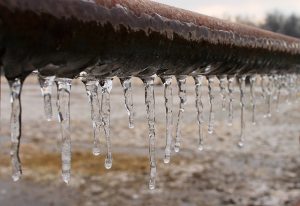With scenes of fluffy, white, glistening snow, winter can truly be a wonderland. Despite the beauty that the season can present, however, there are also dangers that arise in the winter. Snow may look nice, but it can make for hazardous transportation. Sheets of ice also form on streets, sidewalks, and driveways, which can make them dangerous for walking and driving.
The frigid cold temperatures alone can be threatening enough not only to your well-being but your home as well. This may seem harmless, but frozen pipes can hinder water flow or even burst open and cause water damage.
The cold temperatures will freeze the pipes, and any water they contain will turn into ice. As the water transitions into a solid state, it expands in size. If the ice becomes large enough, it will place pressure on the pipe from the inside. With enough force, the ice will burst the pipe open and allow water to rush into your home.
While you cannot stop the cold weather from coming and affecting your home, you can prevent frozen pipes in your home from bursting open and causing water damage.
Use the following tips this winter to inspect for and prevent frozen pipes in your home.
What are Signs of Frozen Pipes?
Physical Changes in Pipes
If your home’s pipes have frozen, then they will likely show signs of freezing including being covered in ice or frost.
Frozen pipes may also form bulges. This can occur when the ice has expanded and misshaped the pipe but has not yet placed enough pressure on the pipe to cause it to break open. However, this is especially concerning because it may only be a matter of time until the bulging pipe bursts and directs water into your home.
Water Supply Issues
When pipes freeze, water inside of them will turn into ice. If there is enough ice, it can form a dam within the pipe and prevent water from successfully travelling through the pipe. Because of this, you may experience water supply problems in your home.
For example, you may turn on the bathroom sink’s faucet for little or no water to come out. In such a case, the water is unable to reach your faucet and provide the water supply you need.
Strange Smells
When frozen pipes cause pipe backups, it can result in the development of weird odors. The smell will have no place to go but back up the pipe and travel into your home.
How Do I Prevent Frozen Pipes?
Insulate the Pipes
Preventing frozen pipes can be done simply by adding insulation to your home’s pipes. There are various types of pipe insulation available for purchase. The insulation can be wrapped or fitted right over the pipe, making for easy installation.
If you are going to insulate your pipes, make sure to thoroughly insulate pipes in more vulnerable areas of your home, such as along exterior walls.
Improve Air Circulation
Certain pipes in your home, such as those beneath kitchen and bathroom sinks, are in an area with poor circulation. This can make them more prone to becoming frozen, as the warm air in your home doesn’t circulate around those pipes. Knowing this, improve the air circulation by opening up cabinet doors beneath the sink. This provides warm air with the opportunity to circulate these pipes.
Maintain Water Flow
When water runs through pipes, it can help prevent pipes from freezing up. That said, allowing a low and slow drip from your home’s faucets ― including those for sinks, tubs, and showers ― can aid in preventing frozen pipes. You might be concerned that even a small drip will be a costly waste of water, but the tradeoff is that you do not have to worry about the costs of restoration and repairs for broken pipes and water damage.
What Should I Do if My Home Has Frozen Pipes?
Shut Off the Water
If you have frozen pipes, you should turn off your water supply to minimize the potential for water entering your home. Even if the pipes have not burst, the pipes might be cracked. Water can then leak into your home through these cracks.
Thaw the Pipes
First, turn on all faucets. While no water will flow out, it will relieve pressure. From there, thaw out the pipe using a heat lamp, hair dryer, or even hot towels. You should never thaw pipes with an open flame.
Hire Professional Help
If you have trouble locating/thawing the frozen pipe, you should get in touch with a plumber. They can help find, thaw, and repair the pipe. If your frozen pipe has resulted in water damage to your home, then you should get in touch with a professional water damage restoration service to address the excess water and restore your property.
Professional Water Damage Restoration Services
ServiceMaster S&R Systems can help homes affected by frozen pipes and other water-related emergencies through the professional water damage restoration services we provide in Aurora, IL, and the neighboring areas in Kane, Kendall, and Will Counties.
Our water damage professionals will work promptly to contain the damage, extract the excess moisture, and thoroughly dry the affected areas with advanced water extraction and drying equipment. Following that, we make repairs and restore your property to a clean and safe environment.




